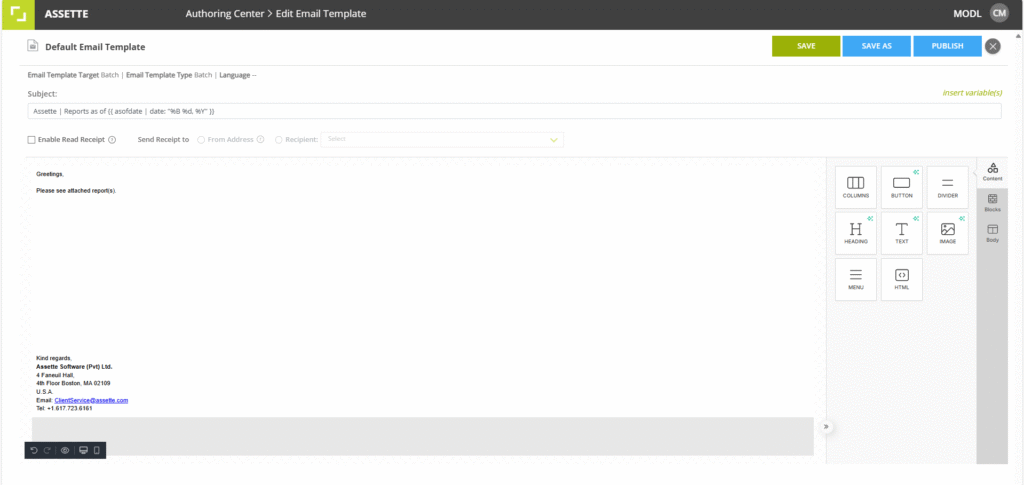Email Templates allow firms to design, manage, and automate client-facing communications that accompany content deliveries generated within the platform. These templates provide flexibility, branding control, and conditional logic to ensure emails are contextually relevant, compliant, and professionally formatted.
All Email Templates are managed within the Authoring Center and are currently used in the Content Hub for batch-generated emails. This capability ensures that every client communication can be standardized yet personalized, aligning with the firm’s content strategy.

Key Features of Assette Email Templates #
Configurable Email Subject Lines #
Email Templates allow the definition of a custom subject line, which supports:
- Static text entries
- Dynamic insertion of data-bound variables (e.g., client name, report date, portfolio name)
- Variable ordering and mixed content formatting
- Character limit validation (500-character maximum)
This ensures subject lines are both informative and personalized, increasing relevance and open rates.
Rich-Content Email Body Editor #
The email body is composed using a visual drag-and-drop editor with advanced layout and styling capabilities. Features include:
- Column and row-based layout blocks
- Modular content blocks such as text, image, buttons, dividers, and HTML
- Responsive design controls for desktop and mobile formats
- A customization panel for styling, spacing, alignment, and visibility settings
- Optional sample template provided as a starting point
The editor supports both static content and data-driven dynamic content.
Dynamic Variables in Subject and Body #
Dynamic placeholders (variables) can be inserted into both the subject line and body content. These are automatically populated based on:
- Client-specific data
- Report metadata
- Account-level details
Variables appear in the interface enclosed in {curly brackets} and allow each email to be tailored to the recipient without manual effort.
Display Conditions for Conditional Content #
Rows within the email body can be conditionally displayed based on the data status of the recipient’s report. Supported conditions include:
- Have Preliminary Data – content shown only if data is preliminary
- Do Not Have Preliminary Data – content shown only if data is final
This feature allows firms to tailor messaging around data readiness, disclosures, or instructions based on account conditions.
Branding and Signature Customization #
Assette Email Templates support rich branding features including:
- Firm logos inserted via upload or image URL
- Hyperlinks for websites, email addresses, phone numbers, or SMS actions
- Social media icons linked to firm profiles
- Email signatures built with images, columns, and text for enhanced professionalism
Design tools allow layout customization optimized for both desktop and mobile rendering, with the ability to selectively display elements per device.
Read Receipt Configuration #
Templates support optional read receipt tracking, allowing firms to monitor email engagement. Users can configure receipts to be sent to:
- A default email address (e.g., clientservice@assette.com)
- The “From” address specified in recipient records
- A specific named internal user from a dropdown
This feature enhances transparency and supports auditability for content delivery.
Save as Draft and Publish Workflow #
All email templates follow a two-state lifecycle:
- Draft – Templates can be saved and edited without being available for use.
- Published – Once finalized, templates are marked as published and become available for use in the Output Center.
This separation supports controlled publishing and iterative template development.
Data-Driven Preview and Test Emails #
Before use, templates can be:
- Previewed with live data, including recipient name, account, and reporting date
- Tested by sending a live email to one or more internal users (retrieved from the Admin Center)
These features ensure that templates function as expected before distribution to clients.
Template Metadata and Management #
Each template is associated with metadata including:
- Email Template Target (e.g., Batch)
- Type and Language (for multilingual support, where applicable)
- Status (Draft or Published)
- Creation and modification history
- Editable and previewable UI options from the listing page
Templates can be filtered, searched, and sorted within the management screen for efficient access.